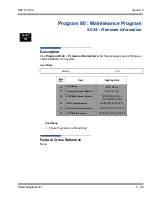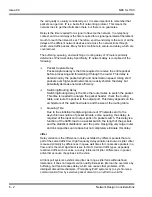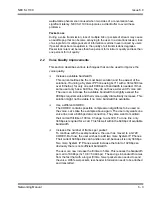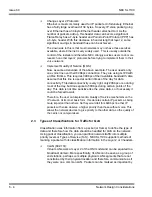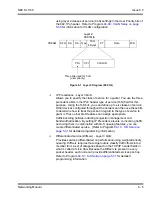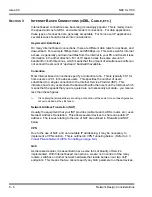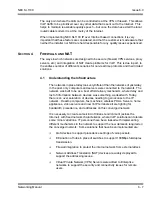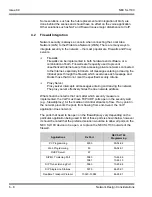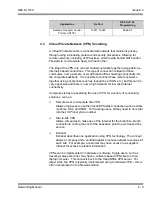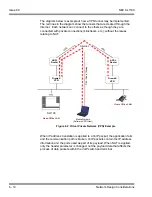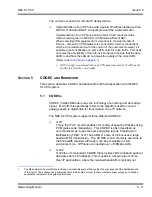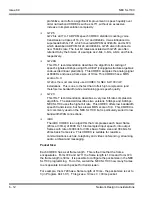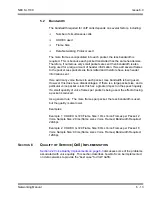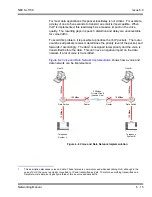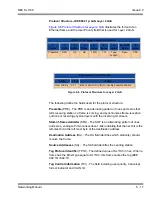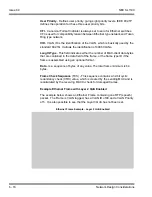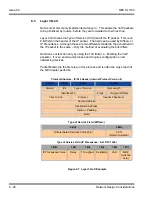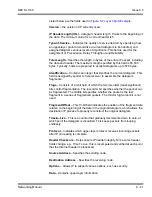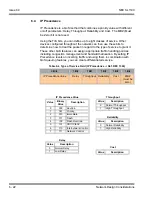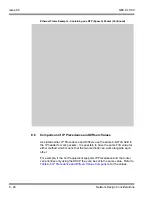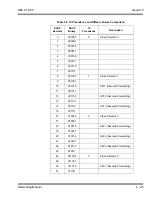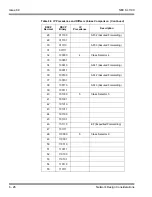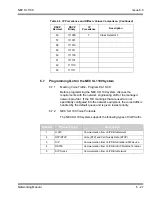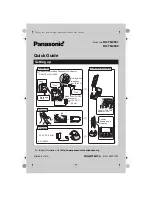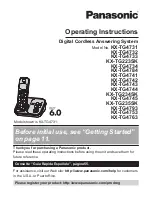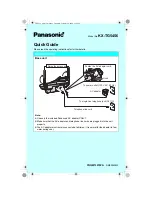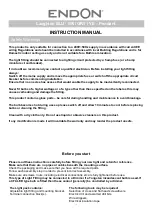
Issue 6.0
NEC SL1100
6 - 12
Network Design Considerations
prohibitive, and offers a significant improvement in speech quality over
older narrowband CODECs such as G.711, without an excessive
increase in implementation complexity.
G.726
G.726 is an ITU-T ADPCM speech CODEC standard covering voice
transmission at rates of 16, 24, 32, and 40kbit/s. It was introduced to
supersede both G.721, which covered ADPCM at 32kbit/s, and G.723,
which described ADPCM for 24 and 40kbit/s. G.726 also introduced a
new 16kbit/s rate. The four bit rates associated with G.726 are often
referred to by the bit size of a sample as 2-bits, 3-bits, 4-bits, and 5-bits
respectively.
G.729A
This ITU-T recommendation describes the algorithm for coding of
speech signals at 8kbps using CS-ACELP (conjugate-structure algebraic
code-excited linear prediction). This CODEC samples the analog signal
at 8000Hz and uses a frame size of 10ms. This CODEC has a MOS
score of 4.0.
G.729 is the most commonly used CODEC for NEC SL1100 VoIP
installations. This is due to the fact that it offers high compression (and
therefore low bandwidth) while maintaining good speech quality.
G.723
This ITU-T recommendation describes a very low bit-rate compression
algorithm. The standard describes two versions 5.3Kbps and 6.4Kbps.
NEC SL1100 uses the higher bit rate. This CODEC offers low bandwidth
speech transmission, but has a lower MOS score of 3.9. This CODEC is
not commonly used on the NEC SL1100, but is particularly suited to low
bandwidth WAN connections.
iLBC
The iLBC CODEC is an algorithm that compresses each basic frame
(20ms or 30ms) of 8000 Hz, 16-bit sampled input speech, into output
frames with rate of 400 bits for 30ms basic frame size and 304 bits for
20ms basic frame size. This CODEC is suitable for real-time
communications such as, telephony and video conferencing, streaming
audio, archival and messaging.
Packet Size:
Each CODEC has a set frame length. This is the time that the frame
encapsulates. For G.729 and G.711 the frame length is 10ms and for G.723
the frame length is 30ms. It is possible to configure the packet size in the NEC
SL1100 programming. To do this, we tell the NEC SL1100 how many frames
to encapsulate into each packet for transmission.
For example, the G.729 has a frame length of 10ms - the packet size is set to
3 (in Program 84-11-01). This gives a 10ms x 3 = 30ms packet.
Summary of Contents for SL1100
Page 1: ...Networking Manual NDA 31190 Issue 6 0 SL1100...
Page 2: ......
Page 4: ......
Page 22: ...Issue 6 0 NEC SL1100 1 2 Introduction THIS PAGE INTENTIONALLY LEFT BLANK...
Page 62: ...Issue 6 0 NEC SL1100 5 30 Programming THIS PAGE INTENTIONALLY LEFT BLANK...
Page 94: ...Issue 6 0 NEC SL1100 6 32 Network Design Considerations THIS PAGE INTENTIONALLY LEFT BLANK...
Page 134: ...Issue 6 0 NEC SL1100 8 10 DHCP Client THIS PAGE INTENTIONALLY LEFT BLANK...
Page 159: ...NEC SL1100 Issue 6 0 Networking Manual 9 25 Figure 9 7 Log In to IP Phone...
Page 181: ...NEC SL1100 Issue 6 0 Networking Manual 9 47 Figure 9 25 IP System Operation Setup...
Page 206: ...Issue 6 0 NEC SL1100 9 72 IP Multiline Station SIP Figure 9 36 NAPT Configuration Example...
Page 230: ...Issue 6 0 NEC SL1100 10 18 IP Single Line Telephone THIS PAGE INTENTIONALLY LEFT BLANK...
Page 232: ...Issue 6 0 NEC SL1100 11 2 NAPT Figure 11 1 NAPT Configuration Example...
Page 242: ...Issue 6 0 NEC SL1100 12 4 All DSP Busy Indication THIS PAGE INTENTIONALLY LEFT BLANK...
Page 290: ...Issue 6 0 NEC SL1100 13 48 SL Net THIS PAGE INTENTIONALLY LEFT BLANK...
Page 291: ......
Page 292: ...SL1100 Networking Manual NEC Corporation of America Issue 6 0...


